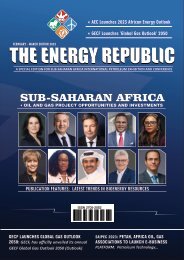The Energy Republic February Edition 2022
This magazine is a special edition focused on the challenges and growth opportunities in Sub- Saharan Africa oil and gas value chain, with a spotlight on stakeholders commentaries, while recommending some key strategies in unlocking the new opportunities in the African oil and gas industry....
This magazine is a special edition focused on the challenges and growth opportunities in Sub-
Saharan Africa oil and gas value chain, with a spotlight on stakeholders commentaries, while recommending some key strategies in unlocking the new opportunities in the African oil
and gas industry....
You also want an ePaper? Increase the reach of your titles
YUMPU automatically turns print PDFs into web optimized ePapers that Google loves.
TOP STORY
terrain though with the most potential, in the
sub-Sahara African region," he concluded.
African oil-producing countries have not fully
benefited from the exploitation of their
hydrocarbon resources. This is part of the
reason why many of these African countries
have adopted local content policies as a
development strategy aimed at increasing the
benefits from the oil and gas industry.
Nigeria is one of those African countries that is
doing very well in terms of implementing local
content development in its oil and gas industry.
It was after the passage of the Nigerian Oil and
Gas Industry Content Development (NOGICD)
Act that the country built Africa’s first FPSO
integration quay, built and installed six entire
FPSO topside modules on TotalEnergies Egina
FPSO.
Egina is TotalEnergies’ third deep offshore
FPSO project in Nigeria after the successful
delivery of the AKPO project (2009) and USAN
project (2012). These projects have brought a
progressive increase in levels of Nigerian
Content, and Egina, being the first major
project launched after the enactment of the
Nigerian Oil & Gas Industry Content
Development (NOGICD) Act of 2010, has so far
the highest level of local content of any FPSO
project in Nigeria.
As a matter of urgency, experts have said that
African countries should learn from the
Nigerian experience and open up the continent
to free exchange of capacity and trade among
member countries.
On his recommendations, The Executive
Secretary of the Nigerian Content Monitory
and Development Board (NCDMB), Engr. Simbi
Wabote, said that
“
There is an urgent need
for the creation of
African Local Content
Fund to support the
continent’s hydrocarbon
projects
as banks and financial institutions are shifting
focus to funding renewable projects against
fossil projects.
Wabote called on the African Export-Import
Bank, African Development Bank (AfDB), and
the African Union (AU) to deepen collaboration
under the African Continental Free Trade
Agreement (AfCFTA), to support hydrocarbon
development on the continent.
“Let me use this opportunity to once again
canvass for the creation of an African Local
Content Fund that could be utilized to set up a
The Execu ve Secretary of the Nigerian Content Monitory and Development Board (NCDMB)
large financial institution for the funding of the
development of oil and gas projects in Africa.
This is especially important against the
backdrop of the reluctant and outright
declaration by some banks and financial
institutions to stop funding hydrocarbonrelated
projects. I hope the AfreExim bank, the
AfDB, or the AU, through the AfCFTA
secretariat, need to institute a form of
contribution no matter how little as a fund to
support the continent’s needs in developing
hydrocarbon,” he said.
Wabote identified legal framework as a key
collaborative strategy to drive local content
practice, adding that many oil producers in
Africa have made efforts to put in place laws
that are investor-friendly to guide their oil and
gas industry.
“I have said it several times that an enabling
legal framework backed with appropriate
legislation is very fundamental in local content
practice. I have lived it, I have seen it. A law or
even a decree as the case may be, depending on
the political arrangement in a country, sets the
framework and boundaries for all local content
practitioners.
“Many African oil producers have made efforts
to put in place investor-friendly laws to guide
activities in their oil and gas industry,” he said.
With the remarkable success that Nigeria has
recorded in the implementation of local content
law in its oil and gas industry, Wabote said that
the country can serve as a model to other
African countries.
The NCDMB boss also noted the need for
collaboration in the area of building
infrastructure. He defined infrastructure as
fundamental facilities, services, and systems
serving a country, city, or other geographical
areas, for its economy to function effectively.
According to him, infrastructure such as
hydrocarbon processing plants, power plants,
pipelines, ports, jetties, terminals, among
others, help to transform resources from their
natural form into usable forms and deliver them
where they are needed to meet the needs of
people in the society.
“The African oil and gas landscape provides
huge opportunities for cross-border
infrastructure to unlock development for
stranded assets, or bring energy closer to the
people. Such infrastructure also leads to the
lower unit of development cost in the long run,”
he explained.
The price of crude oil in recent weeks has been
hovering above $90 per barrel. However,
Wabote said that “This global trend in crude oil
price presents opportunities and challenges to
African oil producers, and its service providers
in respect to field development, security of
supply, affordability, revenue generation,
energy transition, and cost of service.”
Production Decline: The African continent
is home to five of the top 30 oil-producing
countries in the world.
According to the report, the combined daily oil
production of Africa was more than 7.9 million
barrels per day in 2019, which is about 9.6% of
world output. However, the coronavirus
pandemic and recent OPEC production cuts
have dramatically reduced daily outcomes from
the Continent.
Africa’s production has been on the decline,
representing a major challenge for the
continent. West African crude oil production
dropped to 3.71 million b/d in 2020 from 4.12
million b/d in 2019 and is set to decline further
to 3.39 million b/d, according to the Rystad
Energy report.
Nishant Bhushan, Rystad Energy's Upstream
Analyst said, "Oil production in West Africa was
poised for more investment and activity. Last
year’s low oil prices and the unstable market
conditions have continually changed the
outlook, as major operators opted for capital
discipline and limited investment exposure in
regions including West Africa.
26
THE ENERGY REPUBLIC I SPECIAL EDITION















